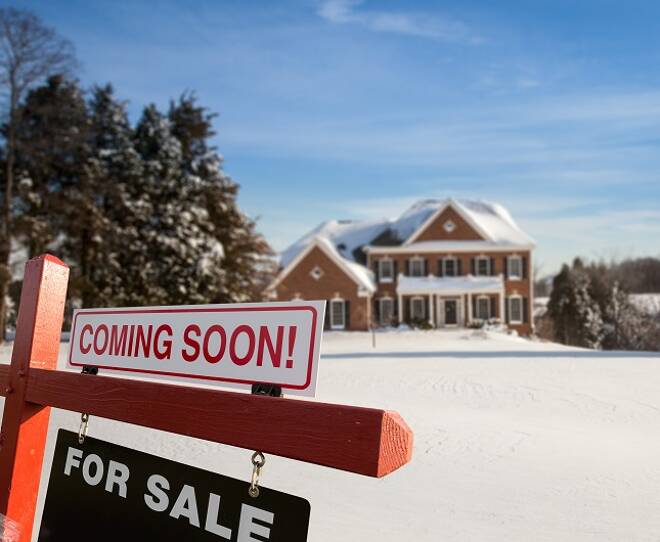Advertisement
Advertisement
U.S Mortgage Rates Ended Flat with Brexit and Trade Battling Yields
By:
Brexit woes drove demand for U.S Treasuries, while a phase 1 trade agreement offset safe-haven demand, leaving mortgage rates flat.
Mortgage rates ended the week flat in the week ending 19th December. 30-year fixed rates remained unchanged at 3.73%. In the week ending 12th December, mortgage rates had risen by 5 basis points to 3.73%. In the week ending 5th December, mortgage rates had also remained flat at 3.68%.
With rates flat in the week, 30-year rates continued to hold close to levels last seen in early November of 2016, according to figures released by Freddie Mac.
Compared to this time last year, 30-year fixed rates were down by 89 basis points.
30-year fixed rates are also down by 121 basis points since November 2018’s most recent peak of 4.94%.
Economic Data from the Week
It was a busy 1st half of the week on the economic data front.
At the start of the week, December’s prelim private sector PMI numbers delivered mixed results, but in favor of the Dollar.
While manufacturing sector activity grew at a slower pace, the all-important service sector activity picked up in December.
On Tuesday, industrial production jumped by 1.1% in November, also supporting yields.
With no stats to consider on Wednesday, economic data was skewed to the negative on Thursday. The initial jobless claims rose from 225k to 234k, with the Philly FED Manufacturing Index falling from 10.40 to 0.30 in December.
From the housing sector, existing home sales slid by 1.7% in November, partially reversing a 5% rise on October. Inventories continued to be an issue, weighing on the numbers….
On the geopolitical risk front, progress towards a phase 1 trade agreement between the U.S and China failed to drive yields northwards. Brexit chatter and the increase in the probability of a hard Brexit pinned yields back.
The polar opposite effects on yields ultimately left mortgage rates flat for the week.
Freddie Mac Rates
The weekly average rates for new mortgages as of 19th December were quoted by Freddie Mac to be:
- 30-year fixed rates remained unchanged at 3.73% in the week. Rates were down from 4.62% from a year ago. The average fee remained unchanged at 0.7 points.
- 15-year fixed rates also remained unchanged at 3.19% in the week. Rates were down from 4.07% from a year ago. The average remained unchanged at 0.7 points.
- 5-year fixed rates increased by 1 basis point to 3.37% in the week. Rates were down by 61 basis points from last year’s 3.98%. The average fee held steady at 0.4 points.
According to Freddie Mac, the economy continued to pick up momentum with a solid increase in residential construction, industrial output, and rising job openings.
While economic and labor market conditions are ripe, improvements in housing market sales volumes will continue to be constrained by inventories.
Mortgage Bankers’ Association Rates
For the week ending 13th December, rates were quoted to be:
- Average interest rates for 30-year fixed, backed by the FHA, remained unchanged 3.79%. Points rose from 0.27 to 0.36 (incl. origination fee) for 80% LTV loans.
- Average interest rates for 30-year fixed with conforming loan balances remained unchanged at 3.98%. Points also remained unchanged 0.33 (incl. origination fee) for 80% LTV loans.
- Average 30-year rates for jumbo loan balances increased from 3.90% to 3.96%. Points decreased from 0.27 to 0.26 (incl. origination fee) for 80% LTV loans.
Weekly figures released by the Mortgage Bankers Association showed that the Market Composite Index, which is a measure of mortgage loan application volume, decreased by 5.0% in the week ending 13th December. In the week ending, 6th December mortgage applications had fallen by 3.8%.
The Refinance Index fell by 7% in the week, partially reversing a 9% increase in the week ending 6th December. The Refinance Index was up by 135% from the same week a year earlier.
The share of refinance mortgage activity decreased from 62.4% to 62.2%, following an increase from 59.0% to 62.4% in the week prior.
According to the MBA, mortgage rates were mostly unchanged, even as a potential trade deal between the U.S and China caused rates to move at the end of last week.
A lack of movement in mortgage rates led to a step back in both refinance and purchase activity.
Purchase activity was reportedly 10% higher than a year ago.
On the housing sector front, 2019 was another year of inadequate supply in relation to demand. Recent housing starts and permits rose strongly in November, suggesting an increased activity. Homebuilder confidence has reportedly surged to levels not seen since 1999…
For the week ahead
It’s a quiet week ahead, with the holiday season in full swing.
From the U.S, key stats include November new home sales on Monday and durable goods orders and core durable goods orders for November on Tuesday.
Weak economic data could have a more significant impact on U.S Treasury yields, with trading volumes on the lighter side.
About the Author
Bob Masonauthor
With over 28 years of experience in the financial industry, Bob has worked with various global rating agencies and multinational banks. Currently he is covering currencies, commodities, alternative asset classes and global equities, focusing mostly on European and Asian markets.
Advertisement
